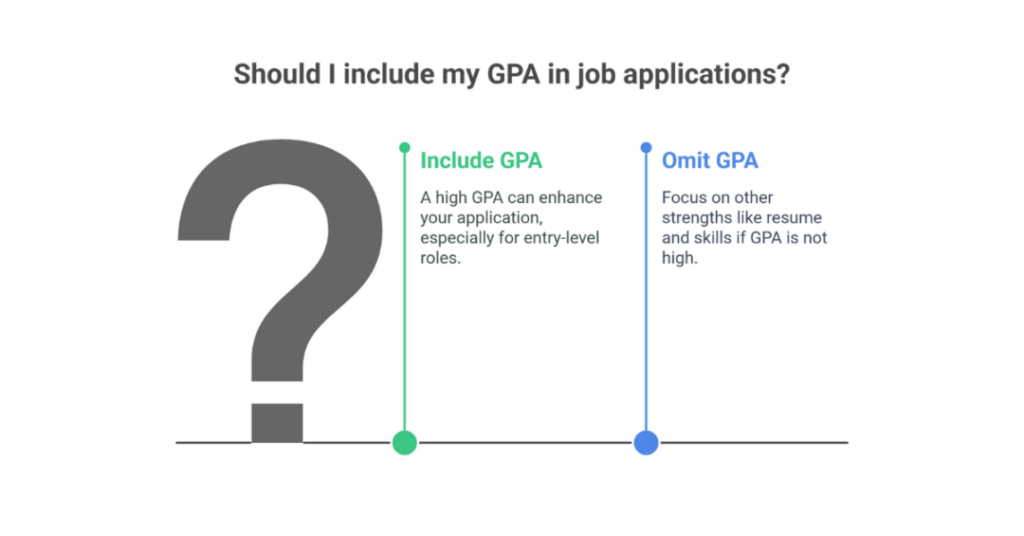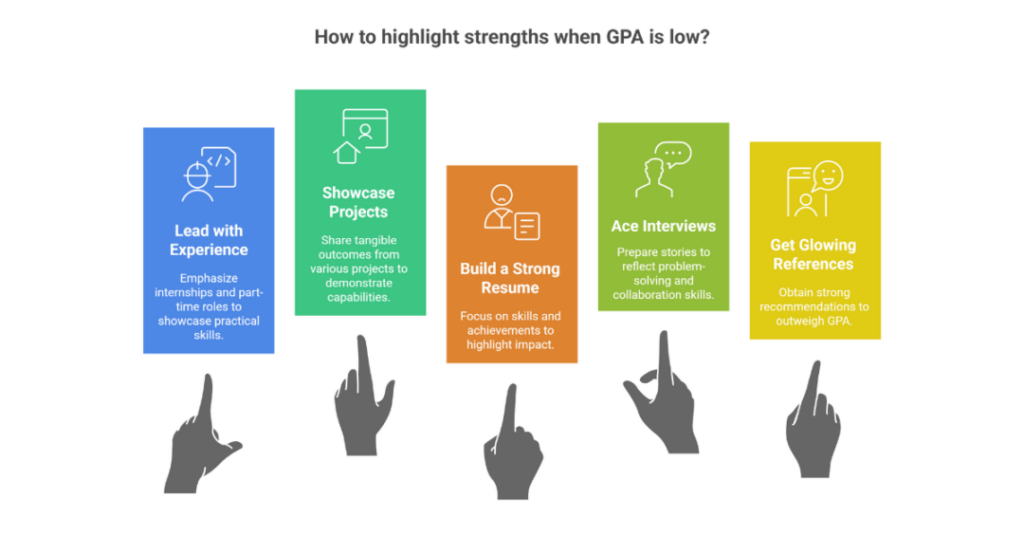3 July 2025
5 minutes read
Do Jobs Look At Your GPA? What Employers Really Think

Key Takeaways
- Do jobs look at your GPA? Yes, especially for recent grads—over 67% of employers use GPA cutoffs during hiring.
- GPA loses importance as you gain experience; skills and accomplishments become the real differentiators.
- Low GPA? Focus on real-world projects, strong resumes, and solid references to stand out.
According to NACE, over 67% of employers screen candidates based on a GPA cutoff, usually around 3.0 to 3.5. Brutal? Yes. Especially when you’re a recent college grad with limited professional experience and a GPA that doesn’t scream “top performer.” In a shaky job market, where every applicant is armed with a polished resume and strong credentials, a few grade points can feel like the difference between getting an interview or getting ignored.
But here’s the truth: your GPA (Grade Point Average) is just one signal. If employers ask for your GPA, it’s often during the first job or internship hunt. After that, demonstrable experiences, job performance, and how well you can manage real-world challenges matter far more.
What is considered a good GPA?
A good GPA typically ranges from 3.5 to 4.0 on a 4.0 scale, especially for competitive roles or top graduate programs. But do jobs look at your GPA? Yes, especially for recent graduates or roles in finance, consulting, tech, and research. Employers often use GPA as a screening tool to assess academic discipline and consistency.
However, once you gain work experience, your GPA matters less than your skills, achievements, and job performance. Ultimately, a strong GPA can open doors early in your career, but it’s not the only factor in long-term success.
Do Jobs Look At Your GPA When You’re a Recent Graduate?
Yes, do jobs look at your GPA if you’re a recent graduate? Absolutely. Many employers may request your college GPA Score during the application process, especially for entry-level roles. A high GPA (typically 3.5 or above) is seen as an indicator of discipline, work ethic, and academic performance, helping hiring managers assess your educational background in the absence of real-world professional experience.

College graduates navigating the job search process often find that many employers ask to include GPA, major GPA, or even transcripts to verify qualifications. While the GPA grading system is often part of the hiring process, it’s not everything. A strong resume, statement of purpose, good grades, and demonstrable experiences and skills can compensate and help you get a job especially as you transition deeper into the professional world where employers no longer focus solely on college grades.
Which Industries and Employers Care Most About GPA?
Fields like finance, consulting, law, and big tech often have strict screening where a good GPA or overall GPA is specifically requested. For job applicants fresh out of educational institutions, this number can showcase your academic achievements, critical thinking, and ability to thrive under pressure, especially in a recession-hit workplace.
In fact, during the job application process, prospective employers may even verify your grades in the background check process. While not all jobs require it, many employers will use your GPA as a quick filter when applying for jobs. Employers look for that edge early on, but as you build real-world accomplishments, you can safely omit your Cumulative GPA from future job interviews, especially when your recruiter, mentor, or resume already reflects your worth.
Do Jobs Look At Your GPA If You Have Work Experience?
Do jobs look at your GPA once you’ve gained solid work experience? In most cases, employers won’t ask for your grade point average unless the role is extremely academic or technical. With years in the field, what you’ve done in the workplace often outweighs what you did in school; your Average GPA might not even come up during the interview process.
That said, in highly competitive industries or during a recession, some employers must screen applicants for their GPA, especially for structured programs. If they want to know more about your academic background, they might still glance at past GPAs, but they’ll focus more on results, projects, and leadership.
How to Highlight Strengths If Your GPA Isn’t High
Do jobs look at your GPA? Yes, but not always in the way you fear. A low GPA doesn’t mean the end of your job search, it just means you need to shift the spotlight. Employers will ask for your GPA sometimes, especially for entry-level roles, but you can still stand out by showcasing strengths that matter more in the real world.

Here’s how to highlight your strengths when your GPA isn’t your strongest asset:
- Lead with experience: Internships, work experience, part-time roles, or freelance gigs can speak louder than grades.
- Showcase projects: Share tangible outcomes from academic, personal, or professional projects.
- Build a strong resume: Focus on skills, achievements, and impact, not just academics.
- Ace your interviews: Prepare stories that reflect problem-solving, collaboration, and growth.
- Get glowing references: A great recommendation from a mentor or manager can outweigh numbers.
Should You Include Your GPA on a Resume or Job Application?
Do jobs look at your GPA? Sometimes, especially if you’re a recent graduate or applying to highly competitive roles. If your GPA is strong (typically 3.5 or above), including it can give your application a slight edge.
However, if your GPA isn’t great or if you’ve gained solid experience, you don’t have to include it. Focus on showcasing your skills, accomplishments, and what you bring to the table. Let your real-world value do the talking.
Conclusion
So, do jobs look at your GPA? Yes, but mostly when you’re just starting out. A strong GPA can open doors, but it’s not the only thing that defines your potential. Over time, your skills, experience, and how you handle real challenges matter far more than a number on a transcript.
If you’re unsure how to position your GPA or overall profile while applying, let Ambitio guide you. From resume building to expert mentorship, we help you turn every part of your journey into a strength. Sign up on Ambitio Pro today and make your profile admission- or job-ready.
FAQs
How important is GPA for experienced professionals?
For professionals with several years of experience, GPA becomes less significant as employers focus more on work achievements and skills.
Can extracurricular activities compensate for a lower GPA?
Yes, involvement in extracurricular activities can demonstrate skills like leadership and teamwork, which can be appealing to employers, especially if your GPA is not as high.
How can I improve my employability if my GPA is low?
Focus on gaining relevant work experience, building a strong professional network, and developing skills that are in demand in your target industry.
Is it necessary to include GPA for non-academic jobs?
It’s not always necessary, especially if the job focuses more on skills and experience rather than academic performance.
What Happens if You Lie About Your GPA?
Lying about your GPA can lead to termination if discovered. Employers can verify GPA through transcripts.
Is GPA Important for Experienced Professionals?
No, GPA is not important for experienced professionals; work experience is more relevant.
Can You Get a Job with a Low GPA?
Yes, focus on highlighting other skills and experiences to compensate for a low GPA.

You can study at top universities worldwide!
Get expert tips and tricks to get into top universities with a free expert session.
Book Your Free 30-Minute Session Now! Book a call now




























